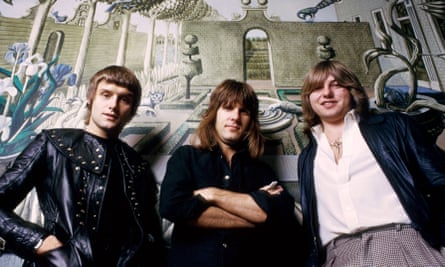Greg Lake, one of the key figures in the prog rock boom of the 1970s, has died at the age of 69. In a statement posted to Lake’s Facebook page, his manager, Stewart Young, said: “Yesterday, 7 December, I lost my best friend to a long and stubborn battle with cancer. Greg Lake will stay in my heart forever, as he has always been. His family would be grateful for privacy during this time of their grief.”
Though best known as a third of the prog supergroup Emerson, Lake and Palmer, Lake first came to prominence as a founder member of King Crimson, singing and playing bass. He had worked with King Crimson’s leader, Robert Fripp, on unsuccessful projects such as the Shy Limbs, but King Crimson’s debut album, In the Court of the Crimson King, proved to be a landmark in the emerging progressive style, reaching N0 5 in the UK and No 28 in the US after its release in 1969. Reviews, though, were mixed – the legendary US critic Robert Christgau called it “ersatz shit”.
Nevertheless, its reputation grew until it was seen as an undisputed classic, with Pete Townshend of the Who calling it “an uncanny masterpiece”. Its standout song, 21st Century Schizoid Man, became a touchstone for musicians attracted as much by its sense of rage as its technical virtuosity.
Although Lake appeared on King Crimson’s second album, he had already left the group to found ELP, alongside keyboard player Keith Emerson of the Nice and drummer Carl Palmer of Atomic Rooster. The group were an instant success, their first five studio albums all reaching the Top 1o in the UK, and their first seven going gold in the US.

They also gained a reputation for their spectacular live performances, which were hugely expensive to mount – “We had 100 road managers at one point, so you can see the cost,” Lake told Melody Maker in 1974 – but attracted massive audiences. They were also reflected in an extravagant live album – their 1974 release Welcome Back My Friends to the Show That Never Ends … Ladies and Gentlemen, Emerson Lake & Palmer was a triple album, but it still went Top 5 on both sides of the Atlantic.
To non-prog fans, though, Lake was best known as the maker of one of the UK’s most enduring Christmas hits. I Believe in Father Christmas reached No 2 in 1975. Lake spoke to the Guardian about the song last month, for an article about Christmas songs to be published next week. “When Pete Sinfield and I wrote I Believe In Father Christmas, it was about how Christmas had deteriorated and was in danger of becoming yet another victim of crass corporate financial exploitation,” he said.
“As much as I love everyone having a good time, it’s about more than 12 pints of lager and a crate of Baileys. It’s more important to make some spiritual human contact, or visit someone lonely. We never had any commercial or financial intentions, but of course, now everyone wants to know how it feels to receive all the lovely royalties, which are apparently delivered by wheelbarrow by Santa himself, after a long day climbing down everybody’s chimneys.”
Emerson, Lake and Palmer’s reputation was damaged by the punk explosion of the late 70s, and they broke up in 1979. Lake had an unsettled 1980s musically, playing briefly with another supergroup of prog alumni, Asia, and forming a new ELP – Emerson, Lake and Powell, with Cozy Powell replacing Palmer. Lake worked as a solo artist, too, before the original ELP reunited in 1991 on an on-again, off-again basis.
Though they never recaptured anything like their original popularity, the swings and roundabouts of rock heritage meant that their final gig, in 2010, was something of a return to the glory days, as they headlined the High Voltage festival in London.
Lake’s bandmate Keith Emerson died earlier his year.
Comments (…)
Sign in or create your Guardian account to join the discussion